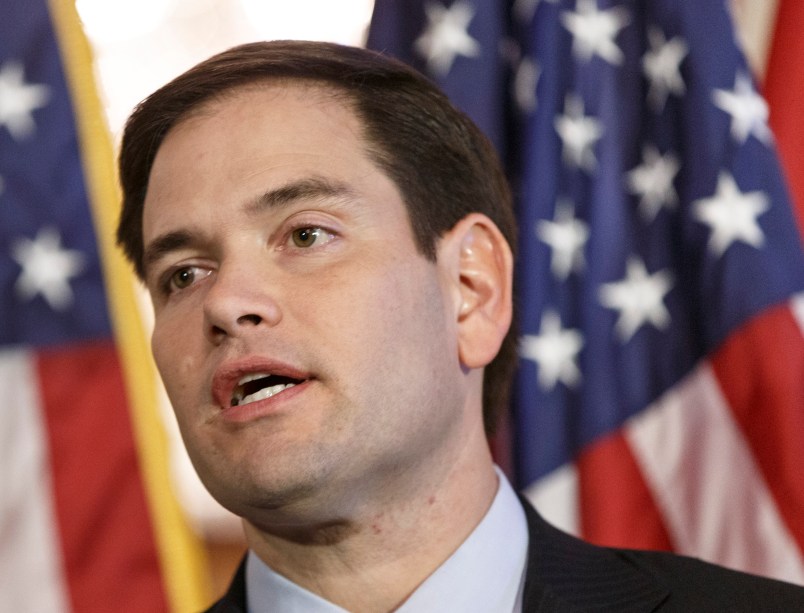Despite the monumental shift on Wednesday toward U.S. diplomatic relations with Cuba after more than half a century, a cornerstone of American policy is here to stay for the foreseeable future: the economic embargo.
Lifting the embargo is a two-step process that requires approval from the executive branch as well as Congress, experts say.
First there would have to be inter-agency approval for lifting the designation of Cuba as a terrorist state, something that President Barack Obama said Wednesday he has asked his administration to review. Then Congress would have to remove the embargo in order to pave the way for the U.S. to establish treaties or trade agreements on Cuba.
“On the trade issue, the beginning of that conversation would have to do with changing Cuba’s designation as a terrorist country,” said Carl Meacham, the director of the Americas program at the Center for Strategic and International Studies. “As far lifting the embargo, that would have to be through Congress. … You need legislative action in order to lift the embargo.”
Congress must also approve funding for the U.S. embassy that Obama said on Wednesday he intends to open in Havana.
It’s unclear if Congress will lift the embargo. Immediate reactions to Obama’s move were mixed within both parties. They included scathing criticisms from two Cuban-American senators, Democrat Bob Menendez of New Jersey and Republican Marco Rubio of Florida.
“President Obama’s actions have vindicated the brutal behavior of the Cuban government,” Menendez, the outgoing foreign relations panel chairman, said.
Rubio said Obama’s move is “just another concession to a tyranny by the Obama administration.” Asked if he’ll push to block funds for the embassy, he said, “I’m committed to doing everything I can to unravel as many of these changes as possible.”
The next chairman, Sen. Bob Corker (R-TN), stayed neutral on the shift, saying the Senate “will be closely examining the implications of these major policy changes in the next Congress.”
House Speaker John Boehner (R-OH) also criticized the move. “Relations with the Castro regime should not be revisited, let alone normalized, until the Cuban people enjoy freedom – and not one second sooner,” he said. “If anything, this emboldens all state sponsors of terrorism.”
The White House is keeping its expectations low for congressional action.
“We start from the premise that the collective policy known as the embargo hasn’t worked. We support efforts to remove those restrictions. However, we understand that Congress is unlikely to take those steps in the immediate future,” a senior administration official told reporters. “What we’re doing today is acting within the boundaries of the law to substantially increase travel, investment, commerce with Cuba through what the president can do. At the same time, we’d encourage members of Congress to look at what they can do to support the direction that the president has set today.”
Lifting the terrorist designation would ease financial transactions and travel between the two countries, Meacham said.
Obama spoke to Cuban leader Raúl Castro for 45 minutes on Tuesday. In a televised address, he said his administration is “taking steps increase travel, commerce and the flow of information to and from Cuba.” He argued that the U.S. embargo on Cuba has not worked for Americans or Cubans, and that despite the tortured relations between the two countries, it’s time to “cut loose the shackles of the past.”
Dylan Scott contributed reporting.







Rubio was acting like one screechy little bitch on CNN.
NO NO NO NO, YOU CAN’T TALK TO THE NASTY COMMIES AND I WON’T LET YOU!! NO NO NO NO NO NO NO!!
¨Congress Stands In The Way Of Lifting The U.S. Embargo On Cuba¨
Oh, that’s just swell. And I was so excited when I read the news today.
House Speaker John Boehner (R-OH) also criticized the move. “Relations with the Castro regime should not be revisited, let alone normalized, until the Cuban people enjoy freedom – and not one second sooner,” he said. “If anything, this emboldens all state sponsors of terrorism.”
Cue the list of countries we have normal diplomatic relations with, whose human rights records fall way way south of Cuba’s.
The Private Sector will see to that.
BTW, I’m listening to World View with Jerome McDonald, and they report that there is literally dancing in the streets in Havana.